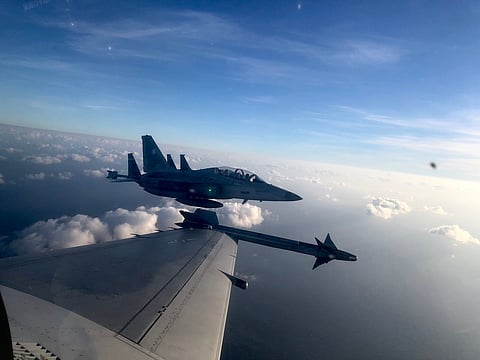
- NEWS
- the EDIT
- COMMENTARY
- BUSINESS
- LIFE
- SHOW
- ACTION
- GLOBAL GOALS
- SNAPS
- DYARYO TIRADA
- MORE

The Philippine Air Force (PAF) has temporarily grounded its entire FA-50 fleet pending an investigation into an ill-fated incident involving one of its jet fighters during tactical night operations in the Bukidnon area at dawn on Tuesday.
In a virtual press conference on Wednesday, PAF spokesperson Col. Maria Consuelo Castillo said the grounding of other jet fighters would “definitely” pose a huge impact but noted that the service “is committed to completing the investigation as soon as possible” so that the fleet could get back to air and perform their mandates, particularly the territorial defense efforts.
“Our intention really is to have that investigation done thoroughly, but swift enough for us not to sacrifice our operational readiness to perform our mandate,” Castillo told reporters.
She noted the military still has different types of aircraft that can be used for maritime patrol.
“We have our other fixed-wing aircraft that we can deploy to do our maritime patrol and monitoring of our territorial waters as well as our areas within the Exclusive Economic Zone,” she said.
“Our monitoring will be around the clock. We have our raiders monitoring. We have all our other aircraft performing maritime patrol,” she added.
Castillo believes that in a worst-case scenario where there’s a need to deploy the FA-50s, the decision will be made by higher headquarters.
“It depends on the situation. But definitely, in terms of our regular maritime patrol, we have other types of aircraft that we can use and as far as monitoring is concerned, our radars also have the capabilities,” she said.
She likewise noted that the ground-based air defense system remains intact.
“The system is not complete for a while, but definitely, our direction is to be able to lift the grounding as soon as possible through a swift but thorough investigation,” she reiterated.
She added, “the intention of the Air Force is always to speed up. Sometimes, within a few days, a few weeks, we will lift the grounding.”
The Philippines acquired the FA-50 fleet from South Korea’s primary aerospace company, Korea Aerospace Industries (KAI), for P18.9 billion, with the delivery made in batches from 2015 to 2017.
Rigid, step-by-step probe
Castillo said part of the investigation was inviting the manufacturer as part of the safety investigators to determine the cause of the unfortunate incident.
“There will be detailed safety investigators for that. They will go to the area where it happened. They will look at the wreckage. They will look at all aspects—that’s just one part. And then they will look at the aircraft records—the maintenance records of our aircraft,” she said.
“And then, at the same time, they will also look at the profile of the pilots. They will also investigate the prevailing weather during that time. Of course, they're going to interview the other pilots who were involved in the flight,” she explained further.
Castillo noted the investigation will go through a “rigid and step-by-step process.”
“As I said, it's a multiple aircraft. They will ask what happened, even the behaviors of the pilots right before the flight,” she said.
She added investigators will also look into “a lot of factors,” including material and human factors.
“Everything about the aircraft, the history of the aircraft, maintenance records, discrepancy records, previously. Then, they will look at the pilots because it's possible, it's a human factor. What are their habits? What is their mental state? Observations regarding them prior to the flight,” she stressed.
Flight procedures will also be checked.
“Remember, there are specific procedures when you do night flying. Night flying is inherently risky. They will also study if the right procedures were followed,” she said.
“An interplay of a lot of things will have to be assessed to come up with a comprehensive investigation. Of course, a part of this is normally we invite our manufacturers,” she added.
Further, Castillo assured that “all PAF pilots who are checked out and qualified to fly the FA-50 go through rigorous training.”
“As I said earlier, they are trained both for day and night operations,” she pointed out.
